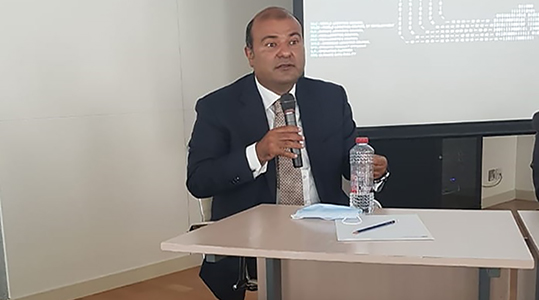The Secretary General of the Union of Arab Chambers, Dr. Khaled Hanafy, indicated that "the Corona pandemic turned the global economy upside down and caused huge economic disruptions through a series of simultaneous shocks," considering that "the most severe repercussions will be on the services and trade sectors, which are the sectors that employ the largest number of the private sector workforce."
Hanafy's words came during the launch of the Introductory Guide to the Digital Economy at the Dubai Financial Center, which was prepared by the Union of Arab Chambers, the Union of Arab Banks, the Global Alliance for Effective Logistics Services (GCEL) and the International Network of Small and Medium Enterprises.
Hanafy praised the existing cooperation between the Union of Arab Chambers and the Union of Arab Banks, through the agreements, signed between the two sides that serve the goals of joint Arab action. Noting the role that the Union of Arab Chambers plays, whether before or during the Corona pandemic, and beyond, he considered that "the Union of Arab Chambers is the true representative of the Arab private sector, which contributes 75% of the Arab GDP, and absorbs about 75% of Arab citizens in the workforce."
Hanafy considered that "the most difficult task is to deal with the impact of the Corona epidemic on the capital market sector, the banking sector and the economy as a whole," pointing to "the role of technology in the time of Corona, as technology helped enhancing the role of depositors in financial markets, and the continuity of exchange despite the difficulties associated with the Corona crisis at least from an operational perspective."
He also pointed out that "the digital economy must include a global rating mechanism that enables all users to make an objective assessment of performance risks when making business decisions," adding that "the stage is not the stage of achieving profits for the private sector, but rather the stage of maintaining survival and continuity through the tools of the new digital development revolution”, stressing that "the crisis in its severity provides an opportunity for a comprehensive reform agenda to address structural problems through a studied shift to digitalization with the aim of building a new development model based on industrial innovation in production and consumption, participation in regional supply chains and economic diversification."
Dr. Hanafy added that "despite the wide spread of the Internet in the Arab world, there is a big gap for its effective use in the field of trade and business, and there is also a great discrepancy in the efficiency of the legislative structures for e-commerce among Arab countries, as only a few of them have made remarkable progress in this field", stressing that "there are still many requirements, the most important of which are digital infrastructure, including financial technology (fintech), payment and electronic signature."
He also emphasized that transport is an essential component in the trade process, whether at the global level or at the Arab level, he saw that the electronic commerce train runs on two main engines, the first one being transactions and payment methods, and the second engine, which is shipping methods (land, sea, air), which are two things far from the reality of digitization in our Arab world. Adding that trade through maritime transport is the primary means in the process of commercial exchange and the transport of goods, as 85 percent of commercial transactions take place through maritime transport means.
Hanafy considered that the main problem in the Arab world is that Arab maritime transport accounts for only a very small percentage of inter-Arab trade, and this is surprising since all countries depend on maritime transport in their global trade, explaining that many Arab countries still have reservations about e-commerce, and these concerns are what led to the lack of development of the reality of this type of trade in our Arab world. He also called on the Arab countries to remove concerns in this regard, because fear is often a criterion for retreat, as while the world is advancing we must also move forward and keep pace with development, because the countries that have achieved development in terms of maritime, land or air transport are those countries that have removed the obstacles that often what stands in the way of progress. He considered that getting rid of fear requires the enactment of laws and legislations that serve the interest and development of our Arab countries.
Source (Union of Arab Chambers)

